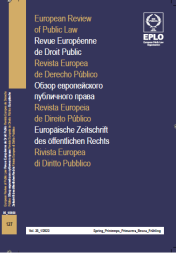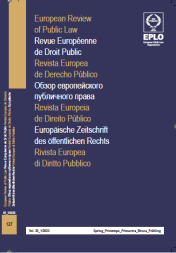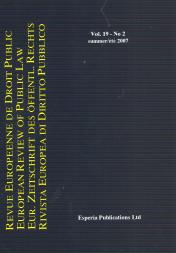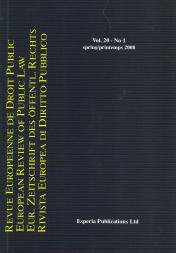
ERPL
Vol. 35, no 1, spring/printemps 2023 (127)
This ERPL issue comprises the proceedings of the EGPL Annual Reunion 2022, which was held from the 9th to the 11th of September 2022, on the subject “Climate Change and Public Law: Challenges, Policies, Future Perspectives”. Papers by eminent scholars from around the world contributing to the debate on this topical and significant subject are published in this issue.
The issue follows the themes of the Conference sessions, that is: “Climate Change: New Challenges to Global and European Public Law”; “Climate Change Governance and Decision-making”; “Effective Judicial Review of Public Action or Inaction related to Climate Change Law”, whereas it also comprises the General Conclusions to the Conference. In addition, papers on the Workshops held within the framework of the Conference on the themes “Urban Climate Change Resilience (UCCR) in the light of SDG11”, “Climate Change and Public Law: Challenges and Application of the Modern Technologies” and “Blog ‘Constitutional Discourse’” are published in the issue.
The issue starts by a paper which aims to highlight that growing amounts of evidence are pointing to major disruption in the variability of climate with large consequences on the economic and social equilibrium of the planet and are also opening new issues regarding liabilities and historical responsibilities of current and future climate change. The paper concludes that the combined effect of the processes under way may lead to political instabilities, high-intensity conflict and strong inequalities, unless we find a collaborative way to address it.
The next paper is demonstrating the need for a Global Pact for the Environment and, more broadly, an international legally binding treaty on environmental rights which would provide for legal foundations and inspire national legislators and national courts and would also stand as a political text by becoming a global reference. Although negotiations on the Global Pact for the Environment, launched in 2018 by a UN General Assembly resolution, have failed, the movement for international recognition of “green rights” is gaining momentum, as evidenced by the adoption in July 2022 by the UNGA of a resolution on the right to a healthy environment.
The third article examines the adverse effects of climate change, focusing on the Eastern European States. Three main questions are answered: Firstly, what are the core challenges caused by climate change that the EU has to face, with special regard to the unique characteristics of Eastern European States? Secondly, what is the definition of climate resilience, and how is the EU trying to ensure the achievement of climate goals? Finally, the question of green democracies is put in the spotlight, significantly whether the tools of direct democracy can help in environmentalism.
The fourth article draws on two case studies: the Paris Agreement and the EU Climate Law showing the multilevel enforcement of climate change policies on the one hand, and a few practical cases with regard to global mandates and local/subnational implementation on the other. The aim is to focus on powers attribution and organizational patterns to respond to climate change concerns, emphasizing the differences between the present multilevel governance of the environment and a global harmonized approach and pointing out strengths and weaknesses of the former.
The fifth article analyzes some trends of climate change governance that impact the development of the so-called “environmental democracy”, such as the increasing role through new channels of both science and public participation. The article gives a brief account of the debate on climate change and democracy, and it links it with the concept of “environmental democracy” and then focuses on how the increasing role of both science and public participation is generating new synergies in the realm of climate governance that widen the scope of the three pillars of environmental democracy as enshrined in Principle 10 of the Rio Declaration and the Aarhus Convention. Apart from highlighting the expanding role of scientific bodies and the proliferation of new forums of public deliberative participation in the realm of climate governance, it also points out the links between these trends and the rising tide of climate change litigation.
The following article deals with the progressive identification of climate litigation by legal literature and practitioners as a useful tool to reinforce the global public-private efforts in the fight against climate change. Undoubtedly, climate litigation sparks fervent debate and promotes social debate by elevating public awareness on the topic. Despite all the controversy, it is an undeniable fact that strategic climate litigation has been following a clear upward trend in the last seven years undergoing a dynamic process of transformation with an impact on diverse legal issues such as: the relation between politics, science and law, the principle of separation of powers, the causation rules, the rules on proof and access to justice in climate matters.
The seventh article claims that global warming has a negative impact on the rights of human beings. The ECtHR has recognized positive obligations to protect against dangerous activities and natural disasters whereas duties to take measures against climate change have been recognized by several national courts but they did not act as lawmakers. The judiciary has to adapt the existing human rights law to the circumstances of a global problem with a completely new dimension, but in the end the decisions how to act will remain in the political sphere.
The eighth article focuses on one aspect of climate litigation: what is the standard of review for adjudicating climate action (or inaction, or inadequacy of such action) of a State? The analysis shows that the different types of standards of review in the Urgenda (‘mimimum reasonableness test’) and Neubauer (a ‘forward-orientend’ version of the principle of proportionality) cases entail a different use and reliance on science and involve a broader or narrower judicial review on Governments’ discretion. The transformation of the principle of proportionality, as developed in the Neubauer case, potentially drives more ambitious climate action; however, this trend could face some obstacles, so that also other principles should be taken into account.
The ninth article maintains that switching to sustainable consumption and production/SCP is critical to an effective transition to low-carbon, circular economy and sustainable development. Ensuring SCP has been and still is one of the greatest challenges over the last 50 years, because of its complexity, involvement of all stakeholders and needs for system thinking, as well as a major challenge for public law. Particular attention should be devoted to Small and Medium Enterprises, the breeding ground for eco-innovation, as well as to appropriate public procurement policies. Change will not occur by force and law; it should be voluntary and well understood to have a chance to deliver. And the public law system has a major role to play.
Summarizing the above, the General Conclusions on the topic of climate change and public law highlight that in order to undertake needed mitigation and adaptation actions, a collaborative global legal framework, in which all concerned parties play their roles in full responsibility, a binding legal treaty, a global pact for the environment, with effective implementation means, is required. This will open a large space and responsibility for public law.
The Section on the Workshops held within the framework of the Conference follows:
The first paper under this Section maintains that urban climate resilience is crucial in the fight against climate change since more than half of the World’s population lives in urban settlements. From 2015 till 2030, the Sustainable Development Goals (SDGs) serve as a basis for green development. Meanwhile, the Basque Declaration was adopted in 2017 for the European region to provide a detailed plan for urban climate resilience based on the three main pillars of sustainability: economic, environmental and social considerations. In this paper, sustainable cities in light of SDG11 are defined and a detailed analysis of human rights considerations is provided.
The aim of the following article is to study the role of Artificial Intelligence (AI) in solving current issues of climate change: it analyzes the advantages and threats of using AI for the development of ethical and legal parameters so as to ensure the safe and effective implementation of the technological system, as well as to ensure sustainable control over its functioning and development trends.
The following article under the Section of Workshops maintains that the blending of financial support with public and private funding is fundamental to foster sustainable investment. To encourage this blending and sustainable finance, the technological tool of platforms has a crucial role to play in discussing and raising finance from both the private and public sectors. It is therefore essential to apply a standardized system such as the EU taxonomy to encourage dialogue among stakeholders, raise more ‘green’ financial resources and facilitate work within platforms.
The next article is focused on the key role lawmakers could play in order to find a better balance in the relationship between human beings and nature. From this perspective, the paper critically analyzes the recent European Mission for climate-neutral smart cities transition titled “100 Climate-Neutral and Smart Cities by 2030” for the sake of reflecting on the consequences of the Mission’s approach, as well as the integration between local and national planning.
The aim of the following paper is to develop and share some suggestions about the role of Artificial Intelligence in challenging climate change. Particularly, AI systems could play a crucial role implementing the European Green Deal, as well as helping to counteract the already widely noticeable negative effects of climate change. However, the massive utilisation of AI tools highlights several theoretical, factual, and ethical issues to public decision-makers and academic scholars, as well as important challenges for the realization of a fair and sustainable future.
Last but not least, the focus of the last paper under the section of Workshops is on the blog Constitutional Discourse, which has been designed to operate as a professional forum for the discussion of pressing Euro-American constitutional law and theory issues, broadly interpreted. Its aim is to provide an opportunity for researchers and scholars who are interested in (comparative) constitutional law to quickly share their thoughts on current issues of the Euro-Atlantic constitutional space.
This ERPL issue concludes with Information on the EGPL Annual Reunion 2022, the Thesis Prize 2022, the Academy of European Public Law 2022 and on the 26th meeting of the EGPL acting as the European Scientific Council of the European Public Law Organization.
Summary
Foreword [IN ENGLISH AND IN FRENCH]
A. Navarra, The Challenge of Climate Change [IN ENGLISH] (14 pp.)
Y. Aguila, Towards a Global Pact for the Environment [IN ENGLISH] (12 pp.)
O. J. Sziebig, The Challenges of the Eastern European States in Building Climate Resilience and Green Democracies – Tendencies and New Happenings [IN ENGLISH] (25 pp.)
D. Bevilacqua, Tackling Climate Change through Multilevel Governance: From Global Mandates to National and Local Implementation [IN ENGLISH] (33 pp.)
C. Plaza, Climate Governance: New Challenges to the so-called “Environmental Democracy” [IN ENGLISH] (33 pp.)
S. Simou, The Emergence and Potential of Climate Change Litigation: Methodological and Theoretical Legal Challenges [IN ENGLISH] (53 pp.)
Th. Groß, Protecting Human Rights through Climate Law Litigation [IN ENGLISH] (14 pp.)
M. De Bellis, Adjudicating Climate Change (In)action from Urgenda to Neubauer: Minimum Reasonableness and Forward-Oriented Proportionality [IN ENGLISH] (31 pp.)
A. Hoballah, From Root Causes to Solution, the Driving Force of SCP, Our Consumption and Production Patterns [IN ENGLISH] (8 pp.)
A. Hoballah, Climate Change and Public Law: Challenges, Policies, Future Perspectives: General Conclusions [IN ENGLISH] (7 pp.)
Urban Climate Change Resilience (UCCR) in the light of SDG11
N. Tribl / A. Szalai / O. J. Sziebig, Urban Climate Change Resilience (UCCR) in the light of SDG11 [IN ENGLISH] (10 pp.)
Climate Change and Public Law: Challenges and Application of the Modern
A. Puzzanghera, The Application of Modern Technologies to Face the Climate Change [IN ENGLISH] (17 pp.)
L. Aristei, Sustainable and Climate Finance – The Use of Platforms [IN ENGLISH] (9 pp.)
M. Bevilacqua, The City-Dimension in the Climate Change Transition [IN ENGLISH] (10 pp.)
C. A. Ciaralli, Artificial Intelligence as an Opportunity to Tackle Climate Change: A Legal Perspective [IN ENGLISH] (13 pp.)
Blog “Constitutional Discourse”
M. Sulyok / L. N. Kiss / M. Mercz / N. Tribl, On the Importance of Constitutional Discourse [IN ENGLISH] (8 pp.)
Information [IN ENGLISH AND IN FRENCH] (4 pp.)





































